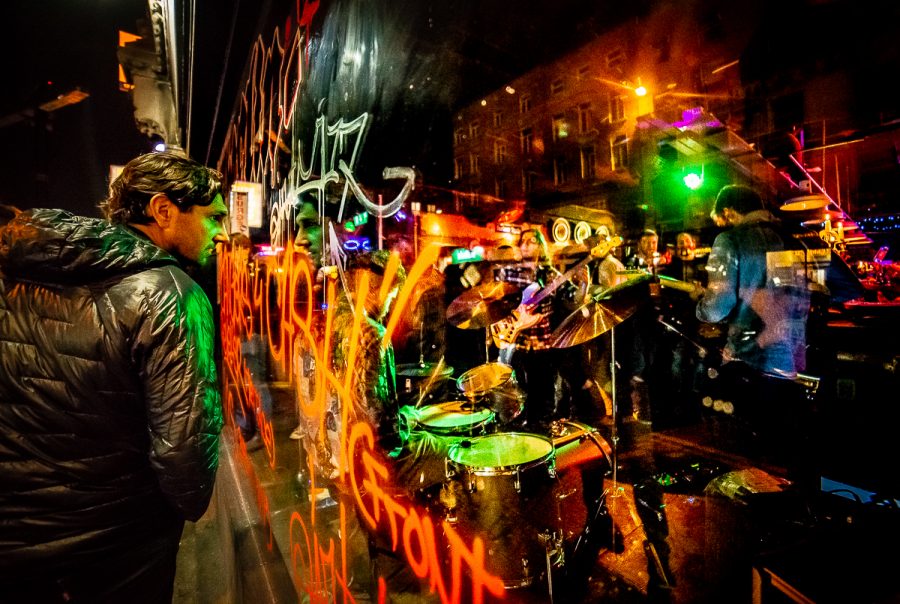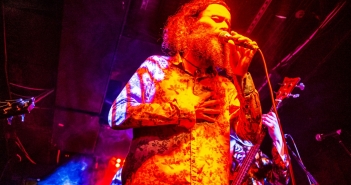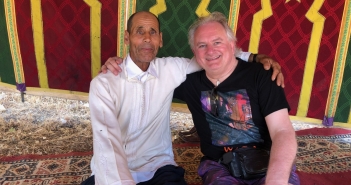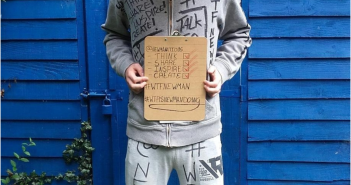Ireland is a funny old place. I’m not sure we’re prepared for the rough times ahead. We’re soon turning one-hundred-years old – which is basically puberty as far as nation states go.
We’re riddled with latent energy – mostly guilt and anger – from the past, just as the future is becoming an unstoppable force. It’s hard to take pride (in its literal sense) in a past so troubled, so instead we focus on the defining moments of history.
Centuries of suffering and persecution of people on this island become a footnote to the realignment of power structures, our identity shrouded in myth and broad sweeps, as bit-part actors in nearly a millennium of recent existence. And I think, an internal struggle between our natural impulses as sardonic inhabitants of a dark, wet and green North Atlantic island.
The coming wave can be extrapolated to a similar battle in the area of artistic self-expression that has been raging for most of our history. What do we value about ourselves and how should we express that in the public sphere? Is society thriving? If not, then am I hearing this reality represented in the everyday art that I encounter?
Access and Capital
This existential discrepancy between the lives we lead and the art that is presented back to us is a discombobulating force, particularly for a nation so unsure of its footing, and in deep crisis. The usual heroes notwithstanding, mainstream radio too often provides us with local music that has been commodified and sanitised for a global market; an idea from elsewhere with a soft Irish focus which tells you that we mean you no harm; a people and an island made of random edges too often represented by a smooth, diluted version of an imported algorithm.
Our music industry is thriving only when we appear to be competing internationally, when our output raises sufficient capital to attract the attention of the people who really should have been paying attention in the first place. And of course, one can argue that it was always thus: that artistic edges have been shaved off in exchange for access and capital. But now technology has turned a razor into a meat grinder and flipped the supply chain on its head.
How can music that requires more than one listen (or even thirty seconds to get going) compete in a marketplace that monitors audience response in real time? How does structurally-reactionary art gain access to those very structures that it is critiquing? How can art that does not factor in commercial concerns – such as advertising, revenue, and so on – hope to succeed in a hyper-capitalist market place? These dilemmas are present across the musical food chain as specialist organisations continue to crumble in the face of ever-expanding technocratic machinations, mostly deserted in a media landscape that has been slowly absorbed by the global monolith.
‘As vibrant and as vital as it has ever been’
There is a line in the sand now. Just as successive generations decide where progress begins and ends – I am seeing people decry the absence of ‘great music’, ‘protest music’, etc., etc., or the crushing, cyclical canard of the current generation not being up to scratch.
It is all out there and it is not hard to find. Music is as vibrant and as vital as it has ever been. However, the access points are frequently controlled and poisoned to the point where people can unironically use a web browser to complain that music stopped when Kurt Cobain died or something.
Every year I see five to ten live acts who literally flip my brain on its head – and that’s after a lifetime of working in music and going to gigs. Audiences are smart and if you treat them like adults and show them the limitless possibilities of music then they will respond accordingly; treat them like objects to generate revenue at the mercy of capital then we end up roughly where we are now.
‘Nobody really gives one solitary shit abut us’
I grew up thinking everyone hated the Irish (via the UK media). From my late teens and onwards, I was lead to believe that everyone absolutely loves the Irish. But it was only when I realized that in the greater scheme things, nobody really gives one solitary shit about us that I began to understand my own identity, and where I plugged into the world both personally and artistically.
I started to learn how not to blink. The idea remains interesting with or without an audience; trying to plug directly into the capitalist monstrosity that the music industry was becoming was a recipe for electrocution.
Everything at the same time is no place for small, different things that need time and space to breathe: gig announcements competing with missing dogs and wellness memes for the surreal oxygen available in the greatest pile-on the world has ever seen. Thousands of years of localized learning and practice reconstituted as instant global spaghetti.
The challenge is to stay focused as an artist, and accept that a sub-subsistence existence in a lifetime of participation in the arts is now not just a distinct possibility, but a likelihood. And that the preservation of tradition and the space for new ideas to emerge and develop could well be an increasingly thankless and costly road.
It is not all bleak of course, not by a long shot. I don’t believe in golden generations, or lists, or any terms that attempt to run complex historical realities through a tabloid filter – I do believe in community and, right now, there are defiantly-specific, strong, and vibrant communities across genres appearing all over the country (with experienced, thoughtful documentarians capturing what is happening).
Uncompromising acts have muscled their way onto a bigger stage by the sheer force of their own momentum and billionaire-owned radio has been compelled to accept the odd blemish in their playlists. Collectives that are popping up in major cities and beyond, call the world as they see it, saying bullshit to rock mythology and transparent hype. This is the hope that I plug into when I wobble and wonder what the hell I am still doing in music.
‘Twenty-first century music promotion is weird’
I’m in my forties now and while I have plenty of energy and love for music, it has become increasingly tough to generate sufficient internal optimism to keep promoting touring acts. The contradictory force of the show itself being the panacea to hopelessness, and also, a source of profound anxiety right up to that point, is something that I wrestle with nearly every day of the year.
As Irish cities and towns are squeezed tighter and tighter and the cost of travelling with luggage continues to climb, inevitably, ticket prices for shows go up and the associated pressure increases. You try to reach people but you are literally shouting over Donald Trump. You shout louder and you realise that you are shouting over the latest tragedy to have befallen the city so you back off and then immediately feel guilty for not promoting the show properly. Twenty-first century music promotion is weird.
That’s the job so I can’t really complain, but at some point the space in my head is gonna be needed for reflection rather than fretting, and I’d also absolutely love a shot at music just as a hobby again. And if I cannot get out of this fantasy industry then I would, at the very least, like a shot at effecting structural change for the good of musicians. Almost nobody speaks for musicians any more.
For more information on Vincent Dermody’s work, see:
Alternating Current Festival, Dublin, 13-15 March 2020:
https://www.eventbrite.ie/e/alternating-current-tickets-90288478269
Enthusiastic Eunuch Promotions:
Facebook: https://www.facebook.com/enthusiasticeunuch/
Twitter: https://twitter.com/ChiuauaTeardrop
The Jimmy Cake:
Official website: http://www.thejimmycake.com/
Facebook: https://www.facebook.com/thejimmycake/
Twitter: https://twitter.com/jimmycake
Into The Music Yourself (Dublin Digital Radio):
https://listen.dublindigitalradio.com/resident?id=599ef9395db85d00110d59fc




